The Barbie movie explained
A brief analysis of the Millennial woman’s Citizen Kane.
[Warning: major spoilers, insufferable fan-girling, questionable grammar choices, and amateur analysis ahead]
Contrary to what you may think, this is not an official Barbie newsletter. I am however determined to roll with the theme for now, because I honestly feel like the Barbie movie is the seminal movie of my life. I don’t think I’m going to be the only one who feels this way…
On Friday I went to see Barbie for a second time. I wanted to find out if it still held up after an initial post-hype viewing, but also because I wanted another chance to take it all in. Giving a review at this point would be too easy. It has everything I love and there’s not much more to say on that.
The nods to old-school, Hollywood sound stage musicals, with fully built sets and meticulous detail are everything I could have ever hoped for. Everyone in it is talented and beautiful. Then there’s the costumes, the impromptu musical numbers, the one-liners, the surprisingly emotional moments… And of course, there’s the bizarre hybrid of culture and commodity. It’s an offbeat indie comedy in a capitalist Blockbuster wrapper. But also, the thing I love most is that it just isn’t what people expected. At all.
Depending on who you ask, Greta Gerwig’s Barbie is either the best movie anyone has seen in years, or the worst. Naysayers, mostly seem to be unfamiliar with Gerwig, are angry about women, or indeed have little concept of absurdism.
Cue comments such as ‘feminism for Basic Bitches’, descriptions of it being ‘surreal and weird’, or criticisms that it’s too political and woke, depending on who’s got the mic. I have taken all of these remarks extremely personally, as if I’m the one who directed it, but I do feel it has been judged harshly by those who wanted it to be something else.
I suppose you’ll get out of Barbie whatever you put into it. As Nietzsche once said:
“If you gaze long enough into the abyss, the abyss will gaze back into you.”
I can only conclude that he visited the Venice Beach before he said that. And he definitely lived in a Mojo Dojo Casa House.
It’s true that some of the feminist messages are delivered quite ham-fistedly, with moments that range from ‘slightly on the nose’, to outright exposition from the narrator. I personally don’t have a problem with the movie making Big Concepts more accessible though I can see the rub.
And frankly, it seems that those who have mistaken it for a children’s movie, or a chick flick think it’s a little too complex anyway (Proust Barbie, anyone?). What I seem to have pinpointed though, is that those who resonate most are women of a certain age. Gerwig is 40, and Margot Robbie is - like me - 33 years old. I am their perfect target audience, and I’m fine with that, because as I pointed out in my last newsletter, that doesn’t happen too often.
Perhaps it’s because we played with Barbie throughout her glory days. Maybe we all have had a moment of realisation in the last 10 years that being a woman is both amazing and terrible. Maybe it’s not that deep at all… but I am willing to take it there.
So here is (a very rusty ex-media students’) analysis of the themes within Barbie, that I believe make this movie so wonderfully rich, layered, and above all, great.
Loss of innocence
At the core of this movie is a coming of age story and I won’t hear otherwise. Gerwig is the queen of this sub-genre (Frances Ha, Ladybird, Little Women - need I say more?) and Barbie is no exception.
Much of this is rooted in how Barbie and Ken are first presented to us in Barbieland and the in-joke being that *this* is how you play with them. The way they float down from their homes and into their cars; the way they eat air; the way they kiss by never touching.
“I thought I might stay over tonight,” says Ken.
“To do what?” enquires Barbie, innocently.
“I’m actually not sure…” he replies.
I loved how the entire premise of Barbieland is based on a naive girl-like fantasy. The sex and romance, or lack of thereof, is completely sanitised because we didn’t understand it at the time, yet we knew it was there. Every night is a disco consisting of a coordinated dance routine, followed by a sleepover with your besties - because that’s what we daydreamed adulthood would be. We all had a ‘weird Barbie’ that we took our rage out on, and we weren’t entirely sure why.
The journey from childhood to adolescence becomes clearer as we see Barbie and Ken grow from childlike and wide-eyed dolls, into something close to adults when they experience ‘the real world’. Even with all its harsh and unforgiving qualities, they also both experience the same world very differently.
Barbie becomes self-conscious, objectified, and troubled by an unsettling undertone of violence -an experience that all women encounter as they make the transition from girldom into womanhood. Ask any woman and they will have their own story of the moment they became painfully aware of how men see them. With every catcall, a deep, unnamed shame rises within us, before we can ever truly understand what it all means.
The Wizard of Oz is a significant influence on this movie; the more obvious visual links, of course, being the pink brick road. But the transformative journey, however traumatic, holds so many parallel’s to Dorothy’s. Dorothy is forever changed by Oz. For Barbie, the whole thing just happens to be in reverse.
Barbie later makes the choice to become a real woman - flawed, struggling, and stripped of her unattainable magic, yet full of ideas and promise. It rings true for all women that there’s no going back - we reach a point where we can’t cling to childhood, but we also don’t always get the choice of when and where we get thrust into adulthood. One day it just happens.
This is possibly why this scene feels so raw. Adulthood is full of ups and downs; complexity but also joy. Barbie’s journey is one we’ve all shared - the painfully reality of leaving our girlhood behind towards something new and exciting, but in a world that can be very hard and scary.
Ken is also not exempt to this - while Ken doesn’t join Barbie in the real world, we do see the parallel of how young boys lose all of their sweetness and gentleness once they are exposed to the concept of what adult masculinity looks like. He goes from loveable Himbo to a genuine threat, as he leads a coup upon Barbieworld that sees him drive her out of her dream house because of her earlier rejection to be his long distance, non-committal, casual girlfriend.
There are so many lovely moments that captured this theme for me. Barbie earnestly telling Ken not to wander too far, and his infantile, agitated ‘I wont!’. Barbie having her make up done by Gloria while anxiously wondering if Ken will still like her. The moment Barbie realises that she no longer understand who she is, because she’s not who she was. The fact that she chooses imperfection and the unknown, is a lot more powerful than you think.
The patriarchy is bad for everyone, actually
I appreciate this is a controversial sentiment, particularly with the points I’m about to make, but in a story about Barbie, Ken really does make this movie. This is partly because Ken discovering the patriarchy, while played for laughs, is a plot device which beautifully illustrates that patriarchy actually fucking sucks for everyone.
In Barbieland, society is everything opposite to what we know. It is Ben Shapiro’s worst fears realised.
Women hold all the power, and Ken’s just do beach. We can identify with Ken’s feelings of inadequacy, self-loathing, and his skewed sense of self-worth (tied to whether Barbie says hello to him that day) because it is, figuratively, our reality.
And like Prometheus, Ken returns from his brief trip to the real world - where ‘being a Ken’ MEANS something - with the wretched gift of patriarchy. This transforms the Barbie’s into mindless slaves, capable of nothing more than propping up the egos of the Ken’s who have taken over.
This cartoonish macho hellscape is undoubtedly where we get the best jokes and the biggest laughs. From the scene where the Ken’s obnoxiously croon Matchbox Twenty to the Barbie’s (as my friend Ellie rightfully pointed out, it should have been ‘Wonderwall’) to the Ken’s being tricked into gleefully explaining the plot of The Godfather, Gosling’s best scenes are when he’s being the terrible version of Ken that destroys Barbie’s perfect world. The all-male board of directors at Mattel was also a hilarious touch. I applaud that Mattel agreed to have the piss ripped out of them despite footing the bill - because behind every great product for women is usually a bunch of guys in suits.
But as we later find, patriarchy isn’t all it’s cracked up to be. Ken admits that he found it hard being in charge, and difficult to maintain the facade. And that he also lost interest when he realised it wasn’t about horses.
The impossible ideals of masculinity are just as damaging as those of femininity. Not everybody fits those ideals, because they are exhausting, unrealistic, or out of reach. And when you don’t fit the ideals, you risk being discarded. Just ask Allan.
Motherhood, sisterhood, and the struggles of being a woman
America Ferrera’s monologue as Gloria feels familiar on many levels, and will also undoubtedly make its appearance on many an Instagram post alongside the more icky ‘Well behaved women rarely make history’. It perfectly captures the every day challenges and contradictions of being a woman. I appreciated it, but for me it said nothing new. This realisation has been with us for quite some time now. Still, it hammered home something important.
There were other interesting dynamics that were a little less obvious.
The most prominent talking point is that of motherhood. Barbie is never a mother - she was created as an alternative symbol of femininity that didn’t hinge on having a husband or raising a child. The very first scene talks about how, before Barbie, little girls were only ever encouraged (read: groomed) to be mothers. Despite this, the theme of motherhood - as a literal and symbolic concept - is woven throughout.
Through Barbie’s eyes we see Gloria’s relationship with her daughter slip through her fingers as her daughter ages, and grows away from her. It’s Gloria’s grief in her changing role as a mother, that lands Barbie in her predicament. One of the final scenes of the movie, Ruth Handler, the creator of Barbie talks about ‘mothers’.
“We mothers stand still, so that our daughters can look back and see how far they’ve come.”
A lot of people thought this meant that the movie was romanticising motherhood as the most noble choice a woman can make - which of course, is a tired trope we’re all bored of. I can see why it would be interpreted that way, and why it pissed so many people off, but that’s not what I took from it. Barbie is a mother, albeit in a conceptual sense only.
Within Ruth’s context of ‘ideas live forever’, it refers to the women that came before us - who paved the way for a more equal world. Barbie was created as a feminist ideal within a particular time and place in history, and society later outgrew it. This is articulately addressed by Sacha’s unrelenting dressing-down of Barbie. Women who lead change rarely get to see it in action during their lifetime - whether that’s on a societal level, or a personal one. It’s tragic, but it’s true.
Many also felt that this talked of the sacrifices our mothers, and grandmothers make for us to have better lives in the most literal sense. Women of our parents and grandparents’ generations had fewer options. Their identities were to raise us. It’s understandably a very emotionally charged moment of the movie because many of these women didn’t have what we have, but also because separation is an inevitable part of this once we reach a certain age, and identities shift.
As my own mum was unwell a few years ago, I felt completely destroyed by this scene, and found myself silently sobbing on both viewings. I expect every woman - regardless of their relationship with their own mother, or whether they are a mother themselves - will feel some sort of way about it. But also, unspoken suffering, missed opportunity, and dreams which are tantalisingly out of reach - even on a day-to-day level - is such a huge part of women’s identity. The more symbolic message feels more fitting and more painful.
Self-identity and what it is to be human
Somewhere, Freud is spinning ferociously in his grave like a rotisserie chicken. We’ve touched upon Barbie and Ken’s identities being inextricably tied to ideals of masculinity and femininity, but not to each other.
At the climax of the film, after the show-stopping ‘I’m just Ken’ musical crescendo, Ken tells Barbie that he doesn’t know how to exist without her, because all of his self-worth ‘lies in the warmth of her gaze’. In Barbieworld, Ken exists only secondary to Barbie - to uplift her, support her, and entertain her. He does not exist for himself until near the end, where he realises he is (K)enough.
(Side note: I actually did not get this pun gag at first, and actually thought he’d given himself some Irish nickname to differentiate himself from the other Ken’s. That’s over-analysis for you…)
Allegedly, Ryan Gosling took on the role of Ken after seeing his daughters’ Ken doll being left face down in the dirt. His story is worth being told, because not only does it capture how women often feel in a society, built, run, and dominated by men, but also because it taps into the primal fear that feminism will render men and their identities pointless.
Equally, it also operates on a higher level of how we tie our identities to how other people view us, and receive us. Particularly as we reach early adulthood. When we don’t quite know who we are, we become a version of ourselves that we think other people want us to be - often at our own detriment.
At the end of the movie, Ken doesn’t quite know who he is, and neither does Barbie. However, I liked that their stories didn’t ‘end’ on a definitive note, because actually, finding out who you are and what you want takes time. Some of us might never really know.
On a human level, this experience is universal and Barbie and Ken’s existential meltdowns are completely understandable. What happens when you aren’t perfect? What happens if you make a mistake? How do you get over being flawed, or not the prettiest, or the smartest? How the hell do you get through the day knowing that life is both finite and ever-changing?
This calls back to Barbie and Ken being ‘children’ transcending into adulthood. The concept of being human is utterly TERRIFYING, even as an adult. Having this realisation as you become a self-aware human, with all the bells and whistles of complex thought and emotion, is too much to bear at times.
Any scene where they threw a tantrum and cried is extremely relatable and cathartic, because I probably would do this every day at work if there was a chance that I wouldn’t be escorted home.
Being human really does suck sometimes, but finally embracing the messiness and temporary state of it all is oddly liberating.
The scene with the old lady at the bus stop is an important one because it’s the first time Barbie ever sees a person who has aged. She thinks she’s beautiful because she’s never encountered it before - and it’s her first real exposure to the concept of mortality. With the perspective that ageing and growing old is a privilege, it indicates turning point for Barbie. This is ultimately what she chooses over her perfect life.
I guess everyone will probably have their own unique view of why.
A love letter to Hollywood
For all it’s layers - most of which I have unapologetically projected - Barbie is just a really fun movie. It’s two hours of pure audio and visual perfection.
I’ve seen comparisons to everything from Toy Story (our hearts do not need another ‘When she was mine’ moment, but we get it thanks to Billie Eilish’s ‘What was I made for?’ ) to Pinocchio, Beetlejuice, and Elf.
Gerwig has publicly shared that The Red Shoes, and Singing in the Rain were movies she asked her cast to watch, to help explain what they were trying to achieve with Barbie.
It’s also chock-full of references if you’re an eagle-eyed film fan. I truly believe all the best film makers (much like the best writers who read) are those which love and appreciate movies of every colour, creed, and genre. There’s plenty to love here with nods to Clueless, Grease, West Side Story, 2001: A Space Odyssey, and the works of Jacques Demy (holla to the niche French film fans in the house. FYI, I’ve seen none of them). It’s fun to spot all the details, and pick up on the throwaway jokes you didn’t quite catch the first time around. I will probably continue to have fun with this for years to come.
Admittedly I have watched Barbie at a very weird time in my life. Perhaps this is why I have made it my entire personality for the last few weeks, and why I already have another Barbie related post lined up to complete this trilogy of ‘me leaking my awkward thoughts into my keyboard.’
Above all, I feel like they just don’t make movies like this any more. Barbie feels so magical, addictive, and immersive. It’s familiar, but new. It’s a little deep, but not so deep it drags you down. And and it’s core, it’s just a really well made movie you can get lost in. And that’s (K)enough for me.


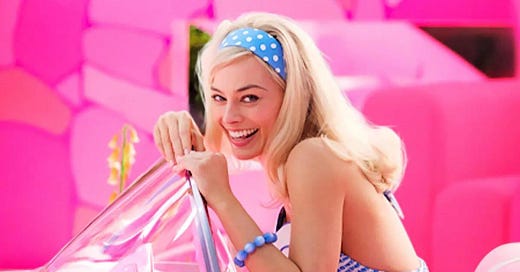



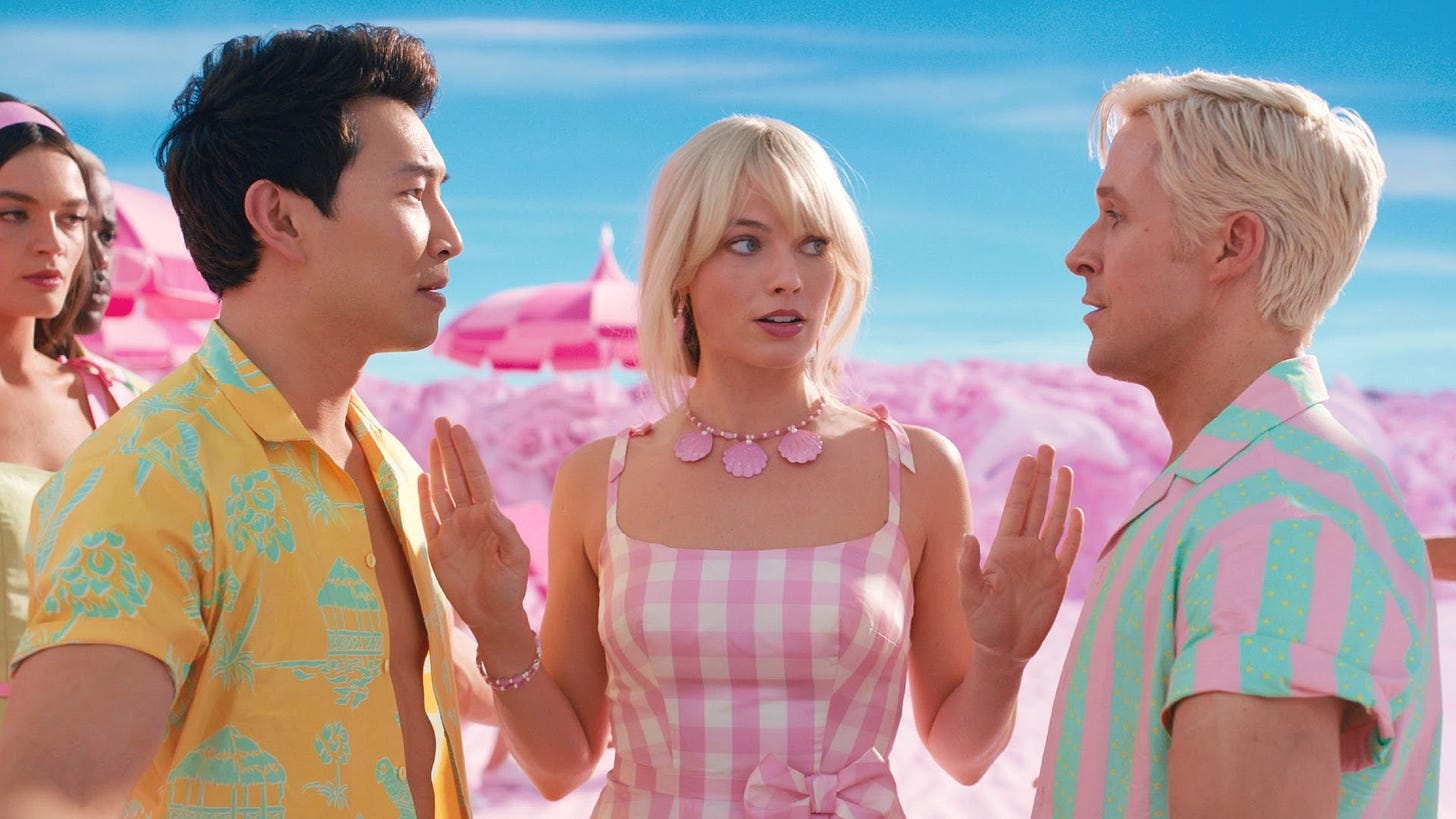
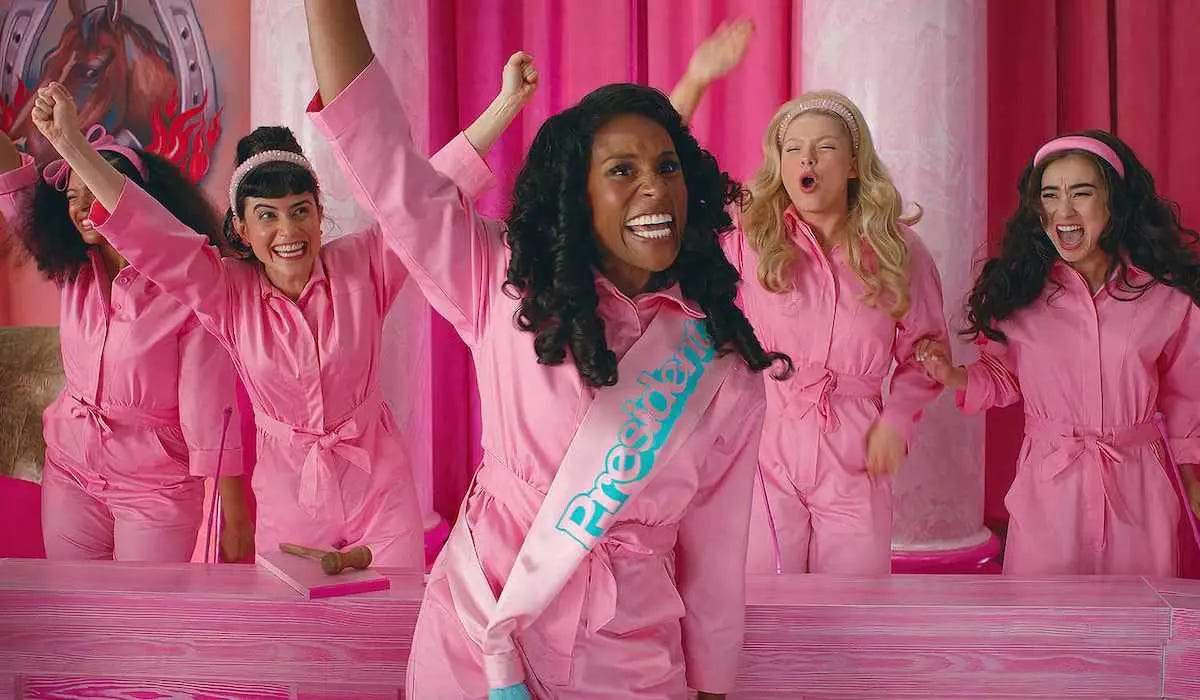
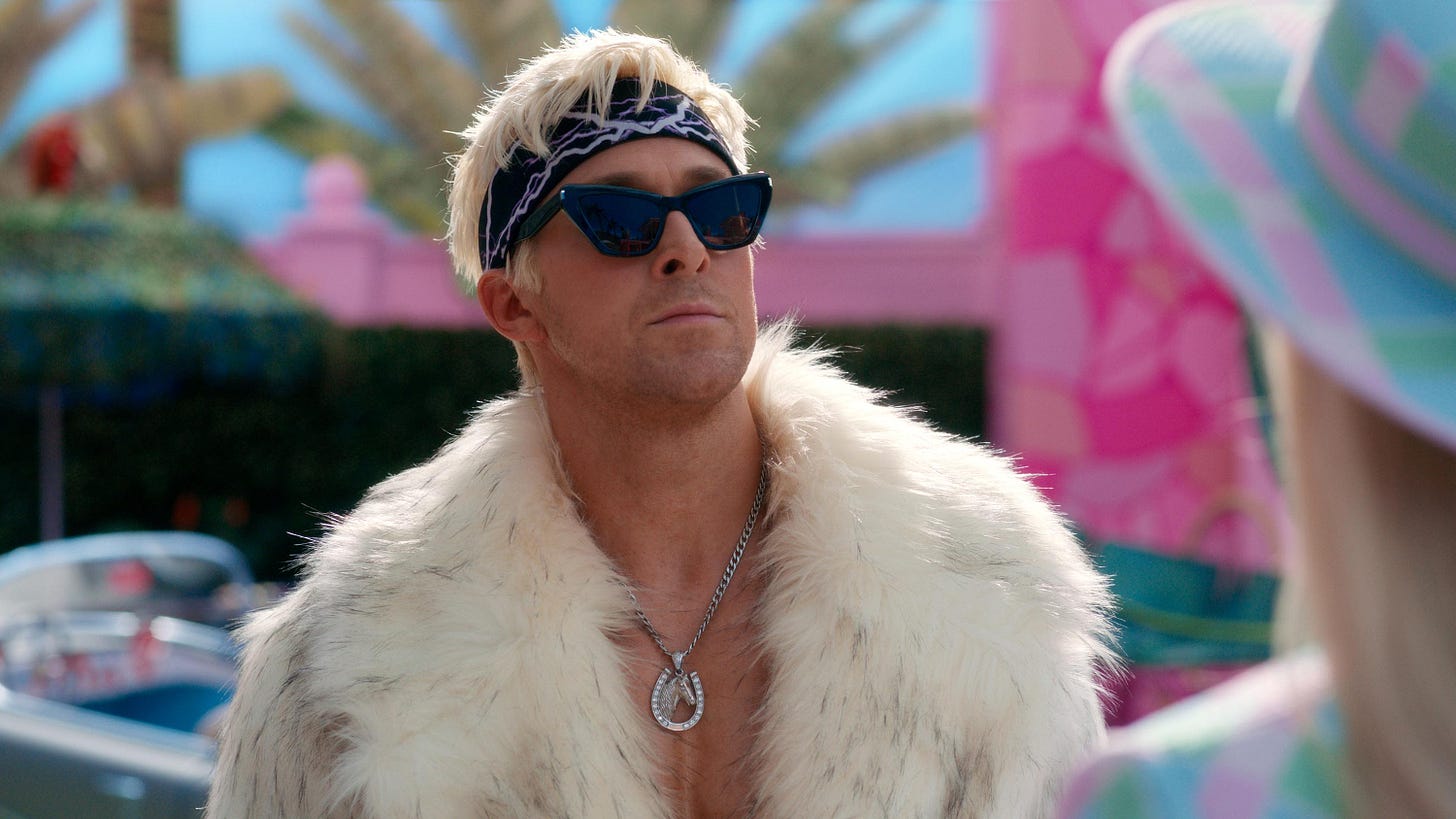
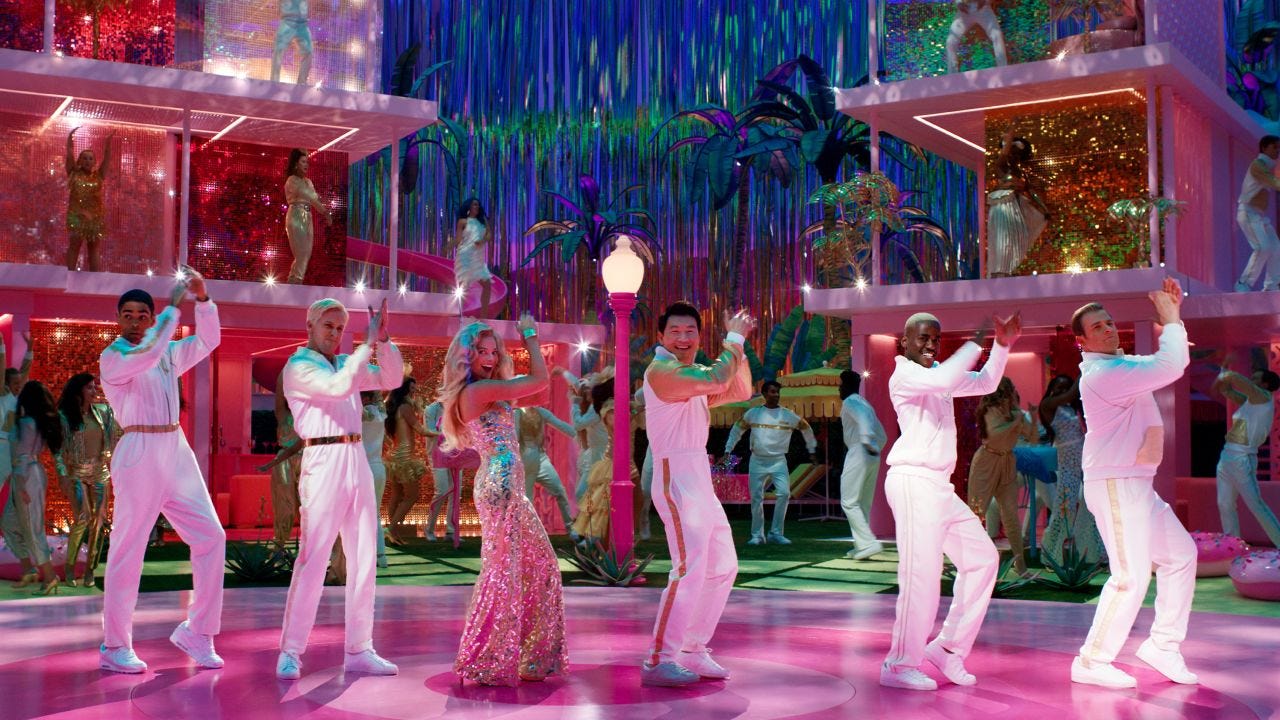
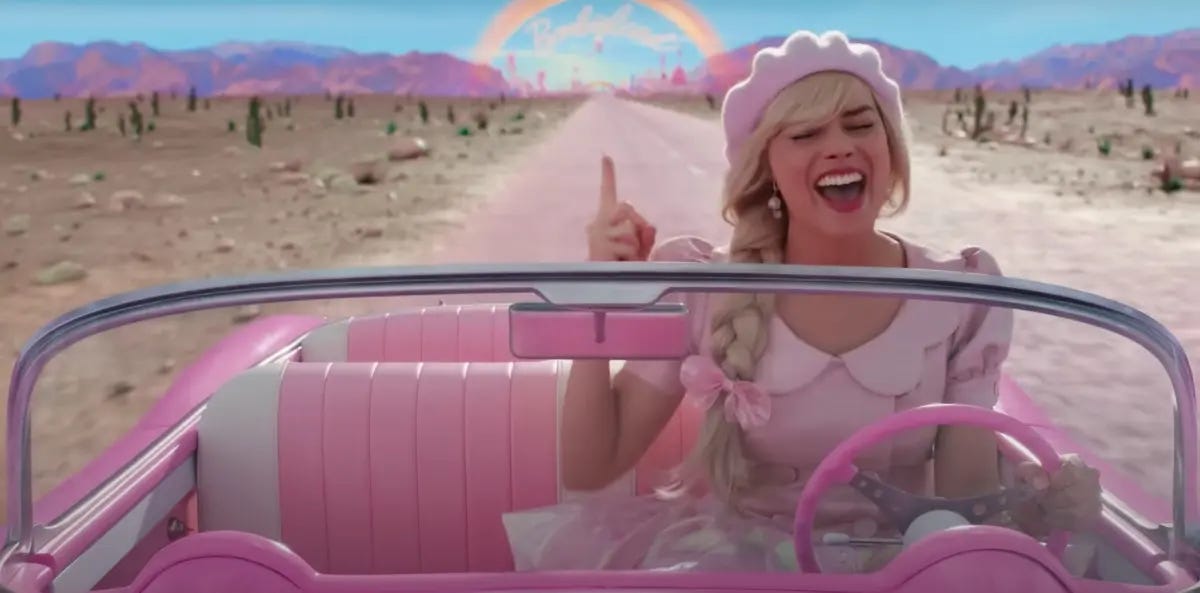
WELL, I bloody loved this! 👏 Have you listened to the Sentimental Garbage episode where they talk about Barbie? Worth a listen! I think I need to go and see it again, it’s the best thing I’ve seen in YEARS!